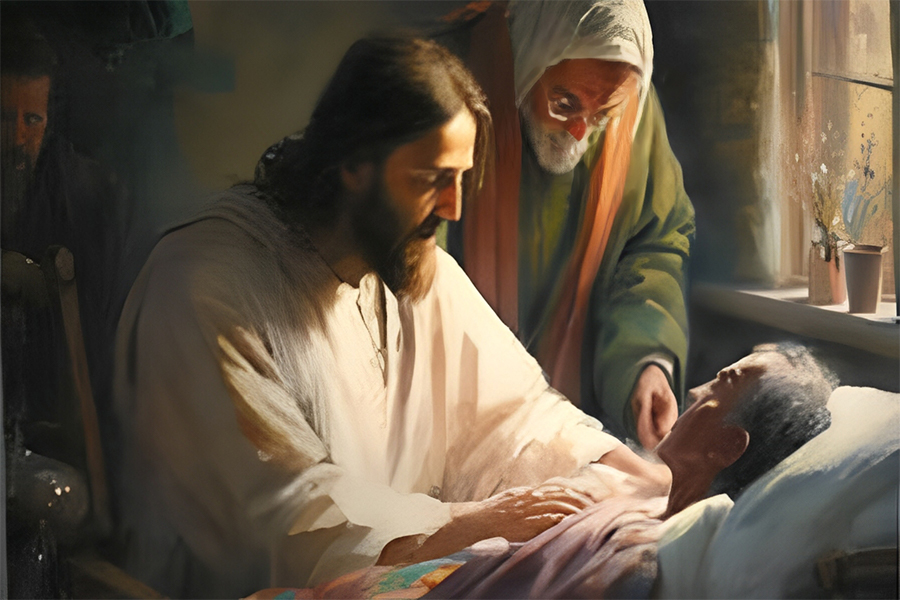
Care for the Sick
by Rev. Gabriel Baltes, O.S.B. | 01/26/2025 | A Message from Our PastorDear Parishioners,
Among Christianity’s greatest concerns and most effective ministerial activities has been the care of the sick. This has been a consistent quality of our faith since the earthly ministry of Jesus precisely because it mirrors the priority that he himself placed on healing those who were ill whether of body, mind, or soul. We know that one of the most dreaded and harmful effects of sickness is that it marginalizes individuals – relegating them to the fringes of a society or culture. There they are frequently ignored or forgotten altogether which is why the phrase, “out of sight, out of mind,” is, unfortunately, aptly descriptive. Jesus, as part of his divine mission he received from his Father, was to restore unity to creation and to re-unite those who, for whatever reason, had been forced to the fringes of life and the void of non-existence.
This is meticulously narrated all throughout the gospels where Jesus is often portrayed in acts of healing, including exorcisms. In the ancient world, there was little, or no, distinction made between bodily illness and demonic possession. Any type of affliction that tormented people and that ruptured the right order God envisioned for creation, was understood to be demonic. Thus, the entire healing ministry of Jesus was a prophetic proclamation announcing that God’s Kingdom was being inaugurated through him.
Christians faithfully continued the healing ministry of Jesus. They did this with such fidelity that sociologists believe this is one reason why Christianity became so popular in its inception despite the fact that it was not a recognized religion of the Roman Empire making its members subject to imprisonment and even execution. But because these early Christians took such great care of their members, the church communities were havens of health in a world where sickness, disease, and epidemics were little understood and terribly feared. Individuals naturally gravitated to those people and places where they witnessed good health and compassion.
As Christianity continued to spread throughout the known world, especially after the Edict of Constantine (313 AD) which legalized the faith, its devotion to the sick and dying also increased. Eventually, it designated one of the seven sacraments of the church for the purpose of healing its sick members. At one point in history, this sacrament was referred to as “Extreme Unction” and was administered as close as possible to the moment of death. The liturgical renewal of the Second Vatican Council, however, restored this sacramental rite to its initial and rightful purpose as a ritual remedy for any baptized person who is seriously ill by virtue of sickness (physical or mental), old age, or imminent surgery. I frequently remind people that the time to call the priest to administer this sacrament is as soon as a serious illness has been diagnosed and to not wait until the person is actually dying or unconscious.
Besides the official Sacrament of the Sick, the church offers other opportunities to care and pray for the sick. One of these is the time-honored Blessing of Throats that is traditionally given on, or near, February 3rd, the Feast of St. Blaise. St. Blaise was the bishop in Sebaste, Armenia who was martyred in 316 AD. There is very little that is factually known about his life, but a number of legendary materials came to be associated with him. He was said to be a physician who cared for humans as well as animals. Because of his holiness of life, he was chosen as bishop by popular acclaim. Eventually, the saintly bishop was arrested for being a Christian and was sentenced to death. While in prison, Blaise is said to have cured a young boy who was choking to death on a fish bone. After he was tortured by an iron rake used to comb sheep’s wool and beheaded, Blaise was declared a saint and the patron of veterinarians, those who tend sheep, and those suffering from illnesses of the throat. It became customary to bless people’s throats with two crossed candles that were themselves blessed the previous day on the Feast of the Lord’s Presentation, sometimes referred to as “Candlemas Day.”
Each year we bless the throats of our school children on St. Blaise’s Day during an afternoon prayer service. This year we are initiating a new practice of having our school children attend the 8:15 Mass that morning, no matter what day of the week February 3rd occurs. Immediately following the Mass, we will bless the throats of the children as well as all those present for the liturgy. As a way of extending our prayers beyond the immediate assembly, the children are being asked to write the name of a sick relative or friend on a card prior to the liturgy. At the time of the throat blessing, the children will process forward to the priest or deacon while carrying this card and then deposit it in a nearby basket before receiving the throat blessing. In this simple ritual way, the personal blessing of one person can be seen to extend to another person. These cards will be available to all those who attend Mass on this day.
The following text is prayed by the priest or deacon at the time a person’s throat is blessed:
Through the intercession of St. Blaise, bishop and martyr, may God deliver you from every disease of the throat and from every other illness. In the name of the Father, and of the Son and of the Holy Spirit. Amen.
Fr. Gabriel, O.S.B.
BACK TO LIST